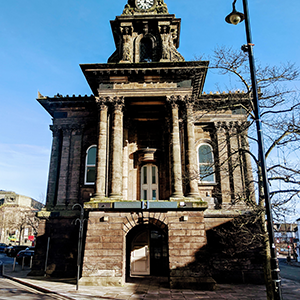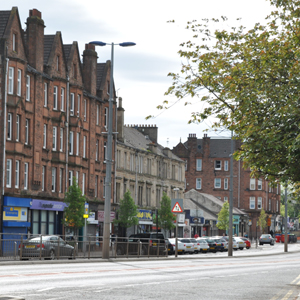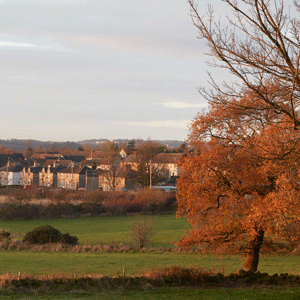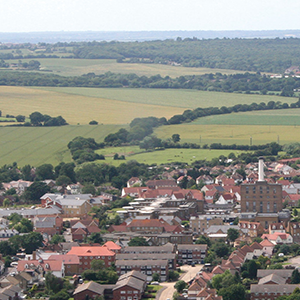We worked with eight communities to pilot new ideas and approaches for keeping cash viable. These pilot communities were selected based on their needs for cash, and for the strength of their local pilot leadership team. The Board also assessed applications to ensure a mix of population needs, a good urban/ rural split, and geographical spread.
After being selected as a pilot in May/June 2020 each pilot community worked with the central team to assess their local needs, and to co-design solutions. All pilot communities tested a slightly different range of services, which best met their needs. The pilots were all being run locally but supported centrally.
Botton Village (North Yorkshire): Botton Village is managed by the Camphill Village Trust, a national charity providing both supported living and day support opportunities to people with learning and other disabilities. Botton Village is rurally located on the North York Moors. The village has a number of residents living on site and provides day placements for those people choosing to live within their own homes but wish to access workshops and social farming opportunities on a daily basis. The nearest neighbouring villages of Castleton and Danby have a total population of around 2,000 people. Botton Village Community and the individuals it supports are dependent on cash, and as a forward-thinking provider of social care, Camphill Village Trust was keen to empower people to become more financially independent, improve self-responsibility, independence and budgeting skills which is far easier to achieve when people have access to their own cash.

Burslem (Stoke-on-Trent): Burslem, the mother town of the six towns that amalgamated to create Stoke, became the first town in the UK with a population of over 20,000 to have neither a bank branch nor bank ATM on its high street in 2018 The Burslem community applied because they were keen to explore solutions for local retailers to deposit and withdraw cash, to have access to cash for the thriving night-time economy and to support consumers with budgeting and digital options.

Cambuslang (Lanarkshire): Cambuslang is a town of c.28,600 people, the third largest town in South Lanarkshire, but since 2018 has had no bank in town, following the closures of branches by three banks in quick succession. According to the latest version of the Scottish Index of Multiple Deprivation (SIMD), some 40% of areas (data zones) in Cambuslang East and 25% in Cambuslang West are in the bottom 20% of the SIMD. The Cambuslang community were keen to address two key issues, first, supporting financially vulnerable customers in accessing cash, and supporting small businesses to be able to access and bank cash. The local leaders of this pilot, Cambuslang Community Council, were passionate about the opportunity to support their community though better access to cash, education and, ultimately, influencing the coming legislation change.

Denny (Falkirk): Denny is a small town located between Edinburgh and Glasgow, with a population of circa 8,000, and with 16% of the population over 65 years old. They are a semi-urban location that has seen a reduction in their access to cash facilities. They were looking to improve the cash deposit and withdrawal facilities for both small local retailers and consumers, and also wanted to support their community to be able to budget and access cash digitally.

Hay-on-Wye (Powys): Hay’s population is less than 2,000, a number which includes a wide cross section of people from a variety of social backgrounds. Hay has a large proportion of independent retailers, and a lot of visitors, making businesses’ ability to access and deposit cash key to the viability of the community. The annual book festival raises additional challenges in terms of large numbers of people needing to access a very limited cash infrastructure for a short period of time. The local leaders of the Hay pilot were keen to explore a wide range of solutions to support their needs, including both a traditional cash access/ deposit infrastructure, better ways of supporting local retailers in their cash handling, and supporting greater digital inclusion.

Lulworth Camp (Dorset): Lulworth Camp is in a remote part of Dorset. It is a Ministry of Defence army barracks with around 2,600 troops through the camp, most of who have no cars and rely on public transport. There are also about 1,500 families and service personnel who are permanently on camp. The closest village is West Lulworth which has a population of around 700 people, and which is also a famous tourist spot as it is situated on the Jurassic coast. Access for cash was a real issue for the families that live on the camp and recruits who train there, with no onsite banking or ATM facilities.

Rochford (Essex): Rochford has a population of around 20,000 and bid to become a pilot community primarily to support its ageing population who are heavily reliant on cash, as well as to support small businesses in the local community who can struggle to easily deposit cash locally. Rochford has been concerned about the viability of its market town since the last bank branch closed and wanted to keep its town centre vibrant and its retailers supported. Many of the surrounding areas, including Hockley, also have limited access to cash facilities. Rochford has an established working party looking at wider regeneration of the local towns which this pilot worked with.

Milisle (Northern Ireland): Millisle is a community of 3,500 people. It is in the top twenty places of deprivation in Northern Ireland as a result of a high percentage of people on benefits. The community has both an aging and young population and sees its population almost double in the summer months due to tourism seasonality. The town has a strong working group looking at both access for cash and wider community issues, and wanted to find ways of supporting residents, tourists and small businesses alike, all of who depend on cash.

